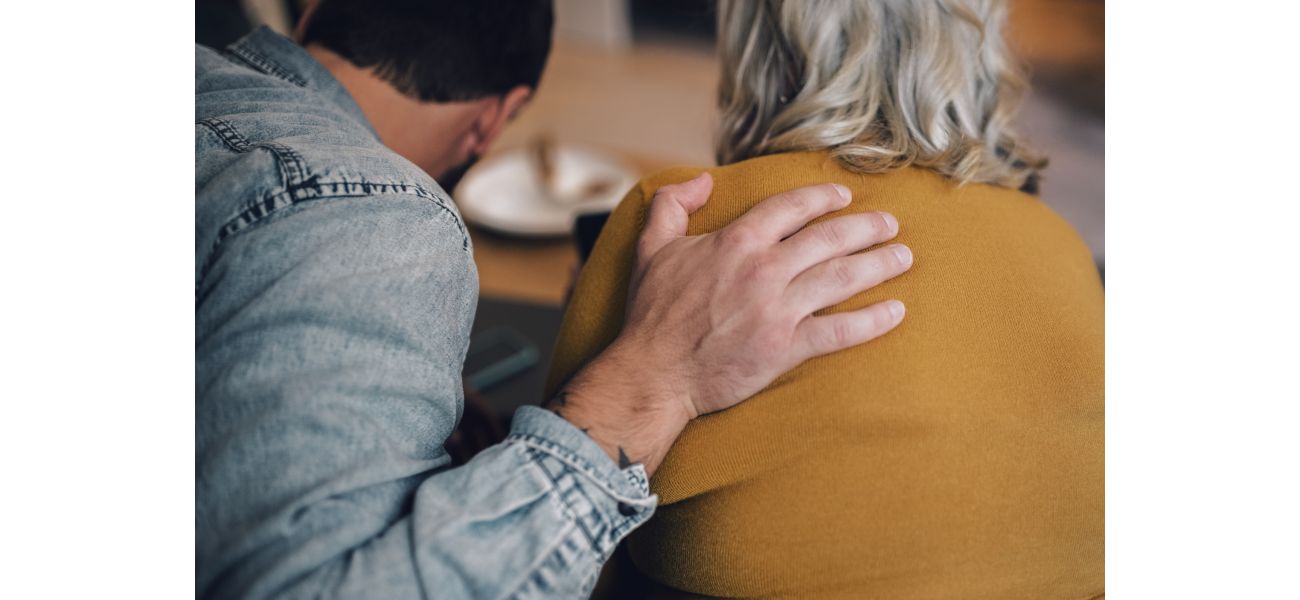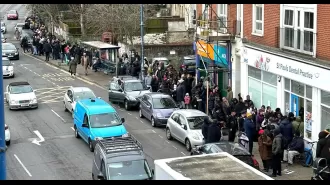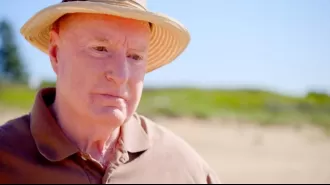Men are needed to help stop violence against women.
Not all men are violent towards women, but all men have a responsibility to help end this crisis.
November 25th 2024.

According to women's safety consultant Karen Whybro, it is crucial for men to have open conversations with the women in their lives. Unfortunately, in England and Wales alone, two million women fall victim to violence at the hands of men every year. This staggering statistic means that approximately one in every twelve women is affected. It's a shocking reality that may prompt some men to take action, while others may feel angry that not everyone is as concerned about the issue.
In fact, a recent YouGov poll revealed that 63% of men believe their own gender is not doing enough to ensure the safety of women and girls. The problem is, many men simply don't know how to help. This is something that we must change. It's important to recognize that while not all men are perpetrators of violence against women, all men have a role to play in putting an end to this emergency.
The first step in addressing this issue is understanding the scale of the problem. Domestic abuse is a widespread issue in the UK, with one in four women experiencing it at some point in their lives. Shockingly, in the last year alone, the police recorded a domestic abuse offense roughly every 40 seconds. Despite this, only 18.9% of women who experienced partner abuse in the last 12 months reported it to the police. It's clear that there is a significant gap between the number of women who experience abuse and those who seek help.
Refuge reports that 84% of victims in domestic abuse cases are female, and 93% of defendants are male. Additionally, disabled women are twice as likely to experience domestic abuse as non-disabled women, and they often endure it for a longer period of time before seeking support. Even more concerning, on average, it takes seven attempts for a woman to leave an abusive relationship for good. These statistics highlight the urgent need for change.
As women's safety consultant Karen Whybro explains, many people are unaware of just how common and pressing this issue is. Education is key in breaking down the wall of silence surrounding violence against women. When people become aware of the reality, they can't look away. However, addressing this problem is not as simple as it may seem. A recent question circulating on social media sparked a heated debate between men and women. The question asked whether people would rather be stuck in a forest with a man or a bear. Surprisingly, a majority of British women aged 19 to 29 said they would choose the bear, while only 17% of men in the same age bracket agreed. The reasoning behind this choice was that while bears may kill, men could also do more harm, such as rape or torture. This response baffled some men, with one commenting that it's unfair to judge all men based on the actions of a few.
Unfortunately, this "not all men" sentiment is often used by men's rights activists, such as Andrew Tate, who has even suggested that rape victims hold some responsibility for being assaulted. These harmful views are becoming increasingly attractive to young men, with one in five men aged 16 to 29 who have heard of Andrew Tate saying they have a favorable view of him.
Karen Whybro explains that many young men are influenced by toxic online influencers, causing them to fear being automatically labeled as criminals simply because they are male. Tackling this issue requires a careful approach, as we don't want to push these men further into the hands of these harmful influencers. It's crucial that we equip men with the right knowledge so they don't fear being treated as suspects if they try to help a vulnerable woman.
One way to address this issue is by having open discussions and promoting empathy and honesty. Sal Naseem, a former Director at the Independent Office for Police Conduct and now an ambassador for White Ribbon, a charity that engages men and boys in conversations about violence against women, has been on a journey of learning and understanding. After working on high-profile cases where women were victims of violence at the hands of men, Sal realized that he could do more to help end this epidemic. He spoke to his wife and daughter in a "safe space," where they helped him understand the daily struggles women face and the false assumptions he had made about gender equality.
Recognizing that it's not up to women to lead the change, Sal became a White Ribbon ambassador in 2022. He now shares his knowledge and insights on social media and LinkedIn, where he has a following of 35,000 people. In one of his posts, Sal emphasized that male violence against women is not just a case of a few bad apples, but a systemic issue that needs to be addressed.
In November 2024, Metro launched a year-long campaign called "This Is Not Right" to address the epidemic of violence against women. Throughout the year, they will be sharing stories that shed light on the scope of the issue. With the help of their partner, Women's Aid, the campaign aims to educate, engage, and empower readers on the topic of violence against women.
According to women's safety consultant Karen Whybro, it is crucial for men to have open conversations with the women in their lives. The statistics are alarming - every year, an estimated two million women in England and Wales become victims of violence at the hands of men. This means that roughly one in every 12 women experiences violence. As a result, many men may feel shocked or outraged by these numbers, and some may even feel motivated to take action.
In fact, a recent YouGov poll revealed that 63% of men believe that their own gender is not doing enough to ensure the safety of women and girls. But the problem lies in the fact that many men simply don't know how to help. This is something that needs to change urgently, especially when we consider that on average, a woman is killed by a man every three days.
It's important for men to understand that not all men are violent towards women, but all men have a role to play in putting an end to this crisis. However, in order to take action, we must first understand the magnitude of the problem. For instance, did you know that one in four women will experience domestic abuse at some point in their lives? Shockingly, the police recorded a domestic abuse offence every 40 seconds last year, and yet only 18.9% of women who experienced partner abuse in the last 12 months reported it to the police.
The majority of domestic abuse victims are female, with 93% of perpetrators being male. This is not just limited to able-bodied women - disabled women are twice as likely to experience domestic abuse and typically endure it for a longer period of time before seeking help. And even when a woman does try to leave her abuser, it takes an average of seven attempts before she is able to do so for good.
Karen Whybro, a women's safety consultant, emphasizes the importance of education in breaking the silence around violence against women. She believes that statistics and data play a crucial role in raising awareness and creating change. However, this seemingly simple solution can often lead to backlash. Earlier this year, a social media question sparked a heated debate between men and women - would you rather be stuck in a forest with a man or a bear? Surprisingly, the majority of young women said they would choose the bear, citing the fear of being killed or attacked by a man. This reasoning baffled some men, who accused the women of painting all men as evil.
This sentiment of "not all men" is often used by men's rights activists, such as Andrew Tate, who has controversially suggested that rape victims are partially responsible for being sexually assaulted. Unfortunately, these extreme views are gaining popularity among young men, with one in five men aged 16 to 29 expressing a favourable view of Andrew Tate. Karen Whybro believes that many young men are being influenced by toxic online influencers who perpetuate the idea that men are automatically seen as criminals simply because of their gender.
It's crucial for men to understand that they have a role to play in ending violence against women and girls, but it's equally important for them to be equipped with the right knowledge. Many men fear being seen as suspicious or a potential perpetrator if they try to help a woman in a vulnerable situation. However, there are ways to be an active bystander and support a woman in need, such as keeping a safe distance and offering a benign question or distraction.
Unfortunately, the issue of male violence against women is a systemic problem and not just a few isolated incidents. This is why Metro launched the This Is Not Right campaign in 2024, in partnership with Women's Aid. Throughout the year, they will be sharing stories to educate and empower readers on this epidemic. Sal Naseem, a former Director for London at the Independent Office for Police Conduct, has become a White Ribbon ambassador and is using his platform to spread awareness and start important conversations surrounding violence against women. He believes that it's not up to women to lead the change, but rather men must take responsibility and be part of the solution. This is a journey that Sal himself has been on, as he realized that he too had a lot to learn and unlearn about gender equity and the daily struggles that women face. It's only through open discussion, empathy, and honesty that we can bring about real change.
In fact, a recent YouGov poll revealed that 63% of men believe their own gender is not doing enough to ensure the safety of women and girls. The problem is, many men simply don't know how to help. This is something that we must change. It's important to recognize that while not all men are perpetrators of violence against women, all men have a role to play in putting an end to this emergency.
The first step in addressing this issue is understanding the scale of the problem. Domestic abuse is a widespread issue in the UK, with one in four women experiencing it at some point in their lives. Shockingly, in the last year alone, the police recorded a domestic abuse offense roughly every 40 seconds. Despite this, only 18.9% of women who experienced partner abuse in the last 12 months reported it to the police. It's clear that there is a significant gap between the number of women who experience abuse and those who seek help.
Refuge reports that 84% of victims in domestic abuse cases are female, and 93% of defendants are male. Additionally, disabled women are twice as likely to experience domestic abuse as non-disabled women, and they often endure it for a longer period of time before seeking support. Even more concerning, on average, it takes seven attempts for a woman to leave an abusive relationship for good. These statistics highlight the urgent need for change.
As women's safety consultant Karen Whybro explains, many people are unaware of just how common and pressing this issue is. Education is key in breaking down the wall of silence surrounding violence against women. When people become aware of the reality, they can't look away. However, addressing this problem is not as simple as it may seem. A recent question circulating on social media sparked a heated debate between men and women. The question asked whether people would rather be stuck in a forest with a man or a bear. Surprisingly, a majority of British women aged 19 to 29 said they would choose the bear, while only 17% of men in the same age bracket agreed. The reasoning behind this choice was that while bears may kill, men could also do more harm, such as rape or torture. This response baffled some men, with one commenting that it's unfair to judge all men based on the actions of a few.
Unfortunately, this "not all men" sentiment is often used by men's rights activists, such as Andrew Tate, who has even suggested that rape victims hold some responsibility for being assaulted. These harmful views are becoming increasingly attractive to young men, with one in five men aged 16 to 29 who have heard of Andrew Tate saying they have a favorable view of him.
Karen Whybro explains that many young men are influenced by toxic online influencers, causing them to fear being automatically labeled as criminals simply because they are male. Tackling this issue requires a careful approach, as we don't want to push these men further into the hands of these harmful influencers. It's crucial that we equip men with the right knowledge so they don't fear being treated as suspects if they try to help a vulnerable woman.
One way to address this issue is by having open discussions and promoting empathy and honesty. Sal Naseem, a former Director at the Independent Office for Police Conduct and now an ambassador for White Ribbon, a charity that engages men and boys in conversations about violence against women, has been on a journey of learning and understanding. After working on high-profile cases where women were victims of violence at the hands of men, Sal realized that he could do more to help end this epidemic. He spoke to his wife and daughter in a "safe space," where they helped him understand the daily struggles women face and the false assumptions he had made about gender equality.
Recognizing that it's not up to women to lead the change, Sal became a White Ribbon ambassador in 2022. He now shares his knowledge and insights on social media and LinkedIn, where he has a following of 35,000 people. In one of his posts, Sal emphasized that male violence against women is not just a case of a few bad apples, but a systemic issue that needs to be addressed.
In November 2024, Metro launched a year-long campaign called "This Is Not Right" to address the epidemic of violence against women. Throughout the year, they will be sharing stories that shed light on the scope of the issue. With the help of their partner, Women's Aid, the campaign aims to educate, engage, and empower readers on the topic of violence against women.
According to women's safety consultant Karen Whybro, it is crucial for men to have open conversations with the women in their lives. The statistics are alarming - every year, an estimated two million women in England and Wales become victims of violence at the hands of men. This means that roughly one in every 12 women experiences violence. As a result, many men may feel shocked or outraged by these numbers, and some may even feel motivated to take action.
In fact, a recent YouGov poll revealed that 63% of men believe that their own gender is not doing enough to ensure the safety of women and girls. But the problem lies in the fact that many men simply don't know how to help. This is something that needs to change urgently, especially when we consider that on average, a woman is killed by a man every three days.
It's important for men to understand that not all men are violent towards women, but all men have a role to play in putting an end to this crisis. However, in order to take action, we must first understand the magnitude of the problem. For instance, did you know that one in four women will experience domestic abuse at some point in their lives? Shockingly, the police recorded a domestic abuse offence every 40 seconds last year, and yet only 18.9% of women who experienced partner abuse in the last 12 months reported it to the police.
The majority of domestic abuse victims are female, with 93% of perpetrators being male. This is not just limited to able-bodied women - disabled women are twice as likely to experience domestic abuse and typically endure it for a longer period of time before seeking help. And even when a woman does try to leave her abuser, it takes an average of seven attempts before she is able to do so for good.
Karen Whybro, a women's safety consultant, emphasizes the importance of education in breaking the silence around violence against women. She believes that statistics and data play a crucial role in raising awareness and creating change. However, this seemingly simple solution can often lead to backlash. Earlier this year, a social media question sparked a heated debate between men and women - would you rather be stuck in a forest with a man or a bear? Surprisingly, the majority of young women said they would choose the bear, citing the fear of being killed or attacked by a man. This reasoning baffled some men, who accused the women of painting all men as evil.
This sentiment of "not all men" is often used by men's rights activists, such as Andrew Tate, who has controversially suggested that rape victims are partially responsible for being sexually assaulted. Unfortunately, these extreme views are gaining popularity among young men, with one in five men aged 16 to 29 expressing a favourable view of Andrew Tate. Karen Whybro believes that many young men are being influenced by toxic online influencers who perpetuate the idea that men are automatically seen as criminals simply because of their gender.
It's crucial for men to understand that they have a role to play in ending violence against women and girls, but it's equally important for them to be equipped with the right knowledge. Many men fear being seen as suspicious or a potential perpetrator if they try to help a woman in a vulnerable situation. However, there are ways to be an active bystander and support a woman in need, such as keeping a safe distance and offering a benign question or distraction.
Unfortunately, the issue of male violence against women is a systemic problem and not just a few isolated incidents. This is why Metro launched the This Is Not Right campaign in 2024, in partnership with Women's Aid. Throughout the year, they will be sharing stories to educate and empower readers on this epidemic. Sal Naseem, a former Director for London at the Independent Office for Police Conduct, has become a White Ribbon ambassador and is using his platform to spread awareness and start important conversations surrounding violence against women. He believes that it's not up to women to lead the change, but rather men must take responsibility and be part of the solution. This is a journey that Sal himself has been on, as he realized that he too had a lot to learn and unlearn about gender equity and the daily struggles that women face. It's only through open discussion, empathy, and honesty that we can bring about real change.
[This article has been trending online recently and has been generated with AI. Your feed is customized.]
[Generative AI is experimental.]
0
0
Submit Comment





